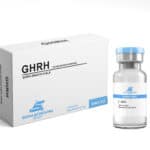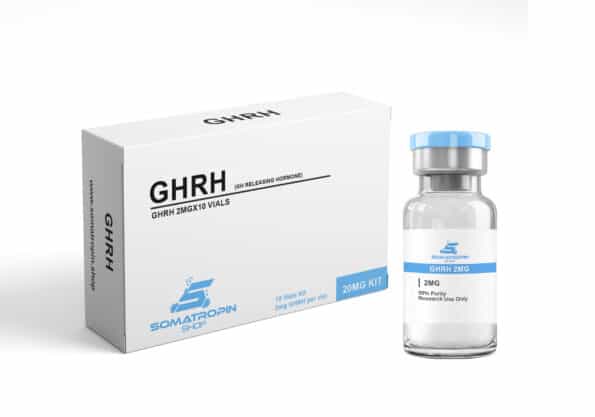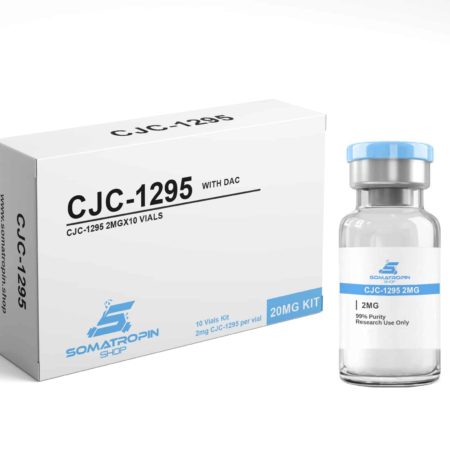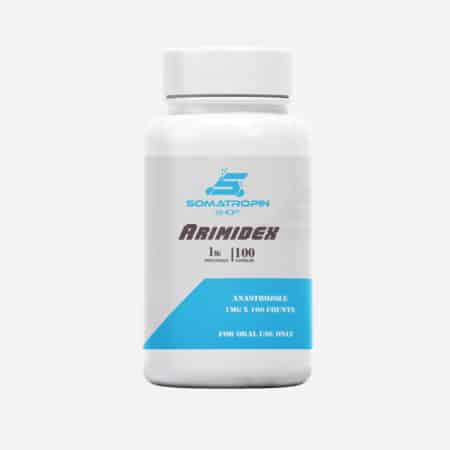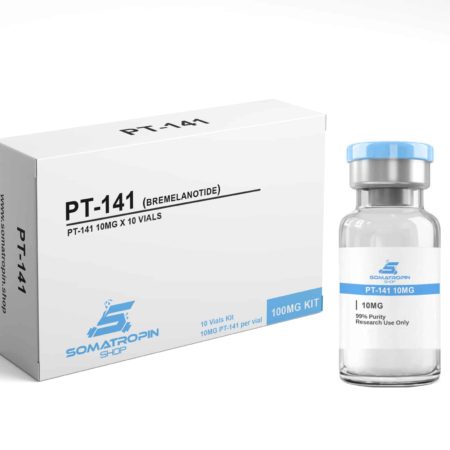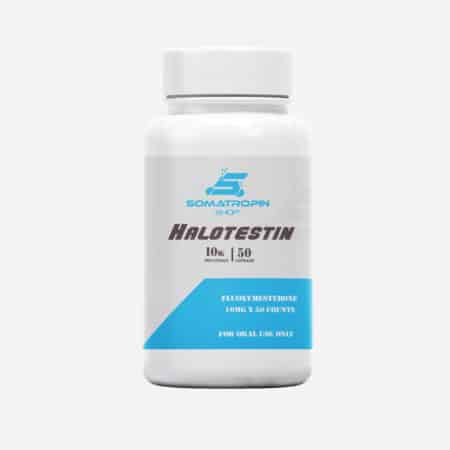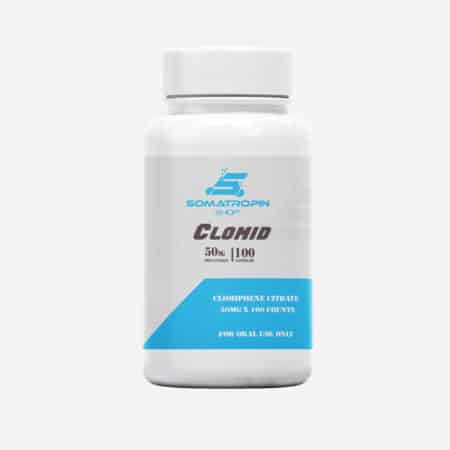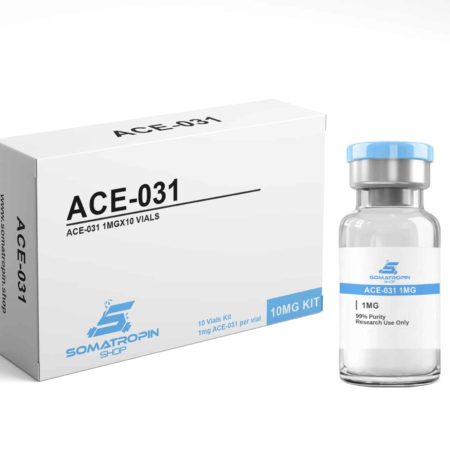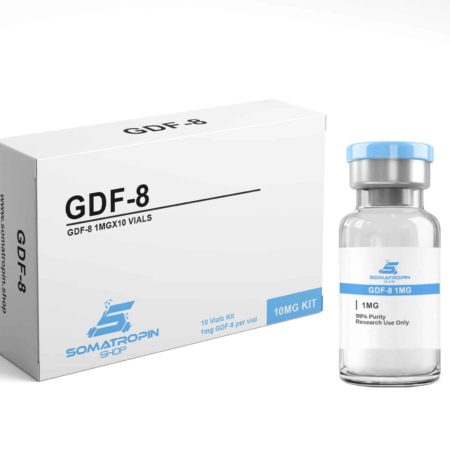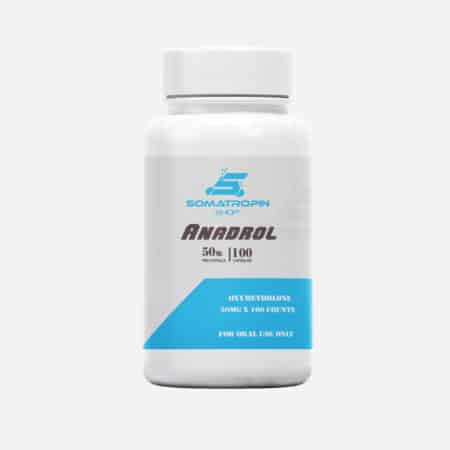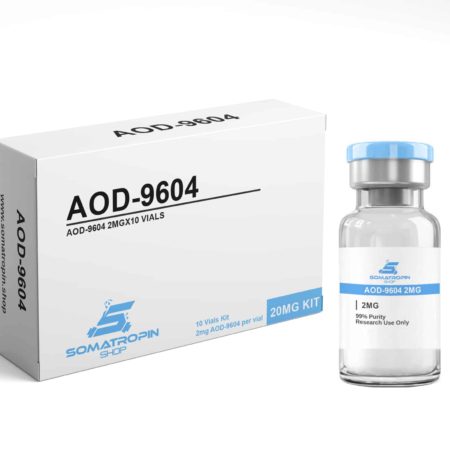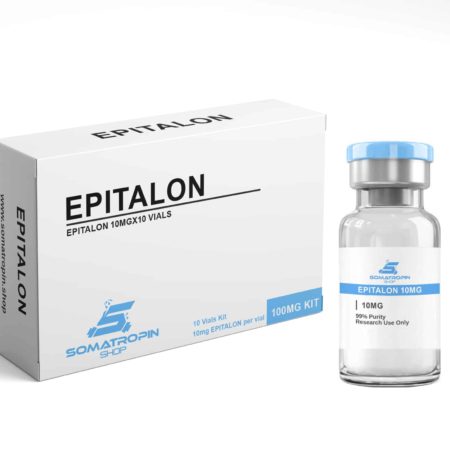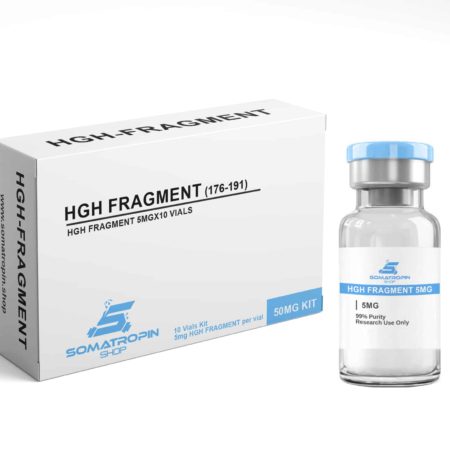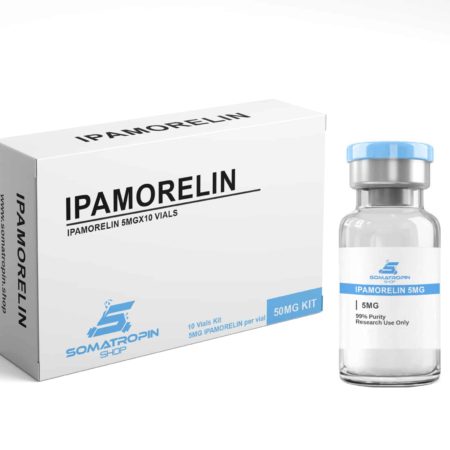What is Growth Hormone Releasing Hormone (GHRH)?
Growth hormone releasing hormone (GHRH) is a naturally occurring peptide released by nerves, called arcuate neurons, in the hypothalamus. The peptide travels from the hypothalamus to the pituitary gland where it binds to the growth hormone releasing hormone receptor and causes the release of growth hormone (GH). Growth Hormone Releasing Hormone is critical for proper growth and development, increasing lean body mass and reducing adiposity (fat tissue). it is indirectly responsible for muscle growth and long bone growth, but has also been found to regulate inflammation, mitigate pain, and play an important role in the sleep-wake (diurnal cycle). It is released in a pulsatile manner from the hypothalamus and thus causes the pulsatile release of GH as well. This pattern of release is important to the function of growth hormone and thus to physiology in general.
GHRH Structure
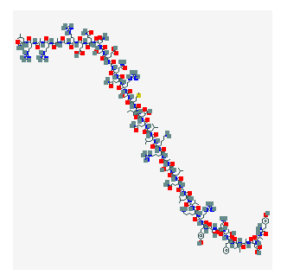
Molecular Weight: 5039.727 g/mol
PubChem CID: 44134750
CAS Number: 9034-39-3
Synonyms: Growth Hormone Releasing Factor, Somatocrinin, Somatoliberin
GHRH is an Unusual Hormone
Growth Hormone Releasing Hormone, unlike other hormones, can exist in several forms. In fact, its size can range from 37 to 44 amino acids, with the 44-amino-acid version be the most common and the standard reference when discussing Growth Hormone Releasing Hormone. Interestingly, these changes in size have no effect on overall function of the peptide as far as experimental evidence can discern and so the 37-amino-acid long version produces the same effects as its longer counterpart.
it has a basal rate of release that varies with age and developmental status, but the pattern of pulsatile release remains regardless of the baseline level of the hormone. Research indicates that preserving the natural pulsation of it, even during exogenous administration, is important to preserving normal physiology and preventing certain side effects.
it differs from other hormones because, within the central nervous system, Growth Hormone Releasing Hormone is found exclusively in the hypothalmus. While many hormones are widely distributed throughout the CNS, GH is not. GHRH is found, however, in peripheral tissues like the pancreas, heart, thymus, and colon
GHRH Analogs Are Common
A number of analogues of GHRH have been developed in an effort to target some of the peptide’s effects while avoiding other properties. Alterations have also been made in order to to prolong the half-life of exogenously administered it. Examples of GHRH analogues include CJC-1295, Sermorelin, and Tesamorelin. Tesamorelin was approved by the FDA in 2010 for the treatment of lipodystrophy (abnormal deposition of fat) in HIV.
GHRH Research
GHRH and Sleep
A significant portion of the total amount of GH released by the pituitary gland is released during non-REM sleep (NREMS). Interestingly, it administered exogenously promotes NREMS while suppression of normal Growth Hormone Releasing Hormone release inhibits NREMS. Studies in mice suggest that it is a critical factor in regulating the sleep cycle. Interestingly, the balance between GH and GHRH secretion may help to explain why mammals cycle between NREMS and REMS (REM sleep) throughout the night. Studies in mice show that an increase in Growth Hormone Releasing Hormone leads to increased NREMS and GH release. The increase in GH then leads to an increase in REM sleep and a decrease in GHRH secretion. This, of course, boosts Growth Hormone Releasing Hormone release and starts the cycle over again. Defects in this axis may help to explain a number of different sleep disturbances as well as why changes in sleep patterns can lead to long-term health problems.
Obstructive sleep apnea (OSA) is well-known to cause a number of neuroendocrine dysfunctions and can lead to everything from heart disease to cognitive dysfunction. Patients with OSA have been found to have severe deficits in GH and GHRH levels, a factor that may explain why OSA leads to cognitive dysfunction as well as obesity. There is some thought that supplementing it in patients with OSA may help them to recover faster from the condition and reduce the occurrence of long-term side effects. Interestingly, patients who have OSA and no cognitive deficits have normal Growth Hormone Releasing Hormone levels. This has lead scientists to investigate the role of GHRH in a number of neurological conditions (e.g. Alzheimer’s disease). Fortunately, CPAP therapy has been shown to improve the cognitive impairment and GHRH deficit associated with sleep apnea.
There is also evidence to suggest that the link between depression and sleep may be due to an imbalance between GHRH levels (to little) and levels of another hormone called corticotropin-releasing hormone (CRH). This imbalance has been shown to cause a decrease in short wave sleep while disinhibiting REM sleep. These studies are in their most preliminary stages, but there is some hope that a deeper understanding of the GHRH-CRH balance may eventually lead to therapies that address not only sleep, but depression and its underlying mechanisms as well.
Traumatic brain injury (TBI) often affects the GHRH-GH axis and leads to substantial disturbances in sleep and mood. In 2017, a phase 2 clinical trial studying the effects of GHRH analogue tesamorelin on sleep in individuals with TBI was undertaken. The study sought to determine if the peptide could produce changes in NREM sleep time compared to placebo. The results of the study have not yet been published, but the study underlines the keen interest in GHRH and its ability to regulate sleep.
Growth Hormone Releasing Hormone and Obesity
GHRH, by stimulating GH release, is a potent muscle-building peptide and anti-obesity peptide. GH promotes the development of lean body mass, and supplementation with GHRH has been shown to do the same. Interestingly, research indicates that obesity causes a decrease in circulating levels of GH by affecting GHRH secretion. Scientists have long known that increased obesity makes it harder to lose weight and affects everything from appetite to the way the body absorbs calories (obesity actually makes the body more efficient at absorbing calories). Now it appears that at least part of this anomaly results from a decrease in GHRH secretion in obesity. In other words, the more adipose tissue the body accumulates, the more GHRH secretion is reduced and the harder it is to lose weight. Scientists speculate that GHRH (or GHRH analogue) supplementation may be an effective means of jump starting weight loss until the cycle can be broken and endocrine regulation can be reestablished.
Growth Hormone Releasing Hormone and Stress
It has long been known that GHRH secretion is suppressed in response to both physical and emotional stress. In fact, careful studies have shown that stress, even psychological stress, can lead to delayed puberty, short stature, and depression. These changes in development can be directly linked to changes in GHRH levels, but the exact mechanism by which stress affects GHRH has been unclear until recently. New research suggests that the change in GHRH secretion is a result of neuropeptide Y levels, which actually cause changes in the neurons responsible for GHRH production and release. It is thought that the change in GHRH release is designed to help preserve energy by restricting growth during times of famine. Unfortunately, this system is activated during any stressful event and prolonged stress, particularly during childhood, can lead to severe restriction of development. There is some question as to whether GHRH supplementation might be indicated for individuals with severe physical and emotional distress so as to offset the negative effects on growth, development, inflammation, and cognition.
GHRH May Reduce Pain
Research in rats shows that GHRH is an effective way to relieve inflammatory pain. Interestingly, the peptide reduces pain without affecting any of the inflammatory mediators that lead to it. This may be clinically relevant as it offers doctors that ability to fine-tune an inflammatory response, reducing pain without impacting other aspects that may be important, such as the presence of nerve growth factor.
Of particular interest is the role of GHRH in reducing the pain associated with fibromyalgia. Fibromyalgia is a difficult to characterize condition associated with widespread pain, fatigue, and sleep disturbance. It has been known for some time, however, that exercise can have a significant and lasting impact on fibromyaglia pain. This fact led scientists to believe that GHRH or GH deficiency may play a role in the development of fibromyalgia. GHRH administration reduces pain in this condition and, as pointed out above, may help to reestablish normal sleep cycles. Though there are currently treatments available for fibromyaglia, they are relatively limited in efficacy. The use of GHRH to treat the condition could represent a breakthrough.
Prostate Enlargement
The exact reason that some men experience prostate enlargement (benign prostatic hyperplasia or BPH) has yet to be elucidated, but there is some evidence to suggest that chronic inflammation plays an important role in the process. Research in mice indicates that GHRH antagonism can reduce inflammatory cytokines in the prostate and actually lead to a reduction in the size of the gland. More importantly, GHRH antagonism appears to prevent hyperplasia in the first place, suggesting that GHRH antagonist therapy may be used to ameliorate BPH long before it becomes problematic.
Supplementation for Muscle Growth in Aging
Reduction in GH secretion and insulin-like growth factor-1 (IGF-1) are a part of aging but lead to decreased muscle mass and decreased strength in older people. Decreased strength leads to a number of problems such as gait abnormalities, bone density loss, changes in posture, and increased risk of falls and injury. Research in non-obese older men indicates that multiple daily injections of GHRH (or one of its analogues) significantly improves muscle strength and muscle bioenergetics without serious changes in blood lipid levels, weight, glucose levels, or overall health.
Interestingly, supplementing with GHRH also improves sleep in elderly patients and may lead to a decrease in cardiovascular mortality. The peptide also boosts cognitive function, likely by impacting sleep. Most individuals in these studies have also reported improved senses of well-being. There is interest in extending these limited trials into long-term studies to determine just how far the benefits of GHRH extend in fighting the effects of aging and what, if any, side effects should be anticipated.
Related Products
All Peptides are shipped non labeled
Out of stock
PT-141, also called Bremelanotide (generic clinical name), is a heavily modified synthetic derivative of alpha-melanocyte-stimulating hormone. It has been tested in clinical trials as a treatment for both male/female hypoactive sexual desire disorder and acute hemorrhage. PT-141 is an agonist for the melanocortin-4 and melanocortin-1 receptors. Research shows that it promotes sexual arousal and stimulates the immune system.
100mg Kit
10mg X 10 Vials
All Peptides are shipped non labeled
ACE-031 is a synthetic protein made up of activin receptor type IIB and the immunoglobulin G1-Fc (IgG1-Fc). It binds to myostatin and related proteins within muscle, rendering them inactive. Research shows it to be useful in stabilizing muscle mass and strength in both primary muscle-wasting disorders and neuromuscular conditions
10mg Kit
1mg X 10 Vials
All Peptides are shipped non labeled
Available on backorder
10mg Kit
1mg X 10 Vials
All Peptides are shipped non labeled
AOD-9604 is a modified version of the hGH fragment 176-191 peptide (contains a di-sulfide bridge) and thus a derivative of human growth hormone (hGH). Originally developed as a lipolytic (fat burning) compound, AOD9604 has shown benefit in studies of heart disease, osteoarthritis/cartilage repair, and metabolic syndrome. AOD9604 stimulates lipolysis (the breakdown or destruction of fat) and inhibits lipogenesis in animal studies.
All Peptides are shipped non labeled
Epithalon (Epitalon) is a synthetic derivative of Epithalamin and a potential modulator of telomerase, the enzyme that maintains and protects the telomere caps at the ends of chromosomes (strands of DNA). Research suggests that Epithalon induces telomere elongation and may fight off the effects of aging as a result.
All Peptides are shipped non labeled
HGH Fragment 176-191 is a small, synthetic piece of natural human growth hormone (hGH). It is often referred to as the “lipolytic fragment” for its ability to boost fat loss. It has been shown to help lowers blood sugar levels and promote cartilage healing without increasing long bone growth, increasing IGF-1 levels, or altering insulin sensitivity.
All Peptides are shipped non labeled
Ipamorelin is a pentapeptide, meaning that its structure is comprised of five amino acids. It is a secretagogue, and is considered to be an agonist, meaning that it possesses the ability to bind certain receptors of a cell and provokes a cellular response. Ipamorelin’s operational mechanics enables the peptide to stimulate the production of pituitary gland-based expression of secretions related to growth amongst animal test subjects. At the same time, the presence of the peptide has been shown to inhibit the production of a secretion known as somatostatin. Additionally, it has been determined that Ipamorelin has the ability to boost the production of IGF-1, or Insulin-like Growth Factor 1. Its presence plays a key role in the overall growth and repair of muscular and skeletal tissue.
All Peptides are shipped non labeled
Categories
Tags
- 100iu
- Anastrazole
- anti aging
- anti wrinkles
- Arimidex
- Bodybuilding
- cjc
- cjc1295
- cjc 1295
- Clomid
- cycle
- dianbol
- fat loss
- genotropin
- gh
- ghrp
- gnrh
- growth hormone
- hgh
- human growth
- human growth hormone
- hygetropin
- igf
- igf-1
- jenotropin
- kingotropin
- kit
- methanabol
- methandione
- mgf
- nordictropin
- norditropin
- orals
- pct
- peptide
- peptides
- primo
- Primobolan
- roid
- roids
- Sarms
- somatropin
- steroid
- steroids
- testosterone

